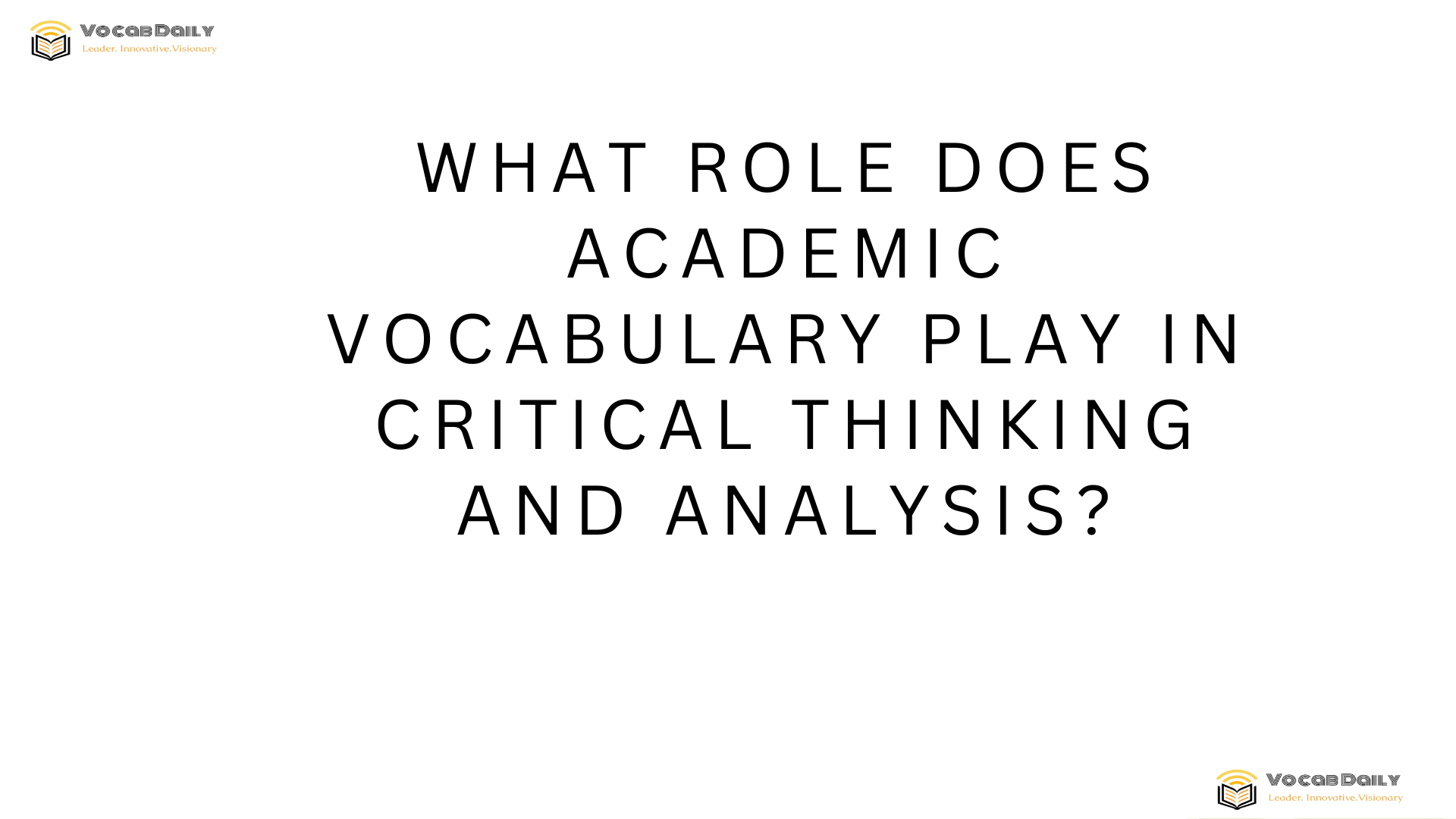Understanding Academic Vocabulary in Critical Thinking
Academic vocabulary plays a foundational role in developing critical thinking and analytical skills. These specialized words and phrases are essential tools that enable students and professionals alike to comprehend complex concepts, articulate ideas clearly, and evaluate information effectively. Without a strong command of academic vocabulary, individuals may struggle to engage deeply with texts and ideas, limiting their ability to think critically and perform rigorous analysis.
Critical thinking involves the ability to evaluate arguments, identify biases, synthesize information, and draw sound conclusions. Academic vocabulary provides the linguistic framework necessary to perform these tasks. Terms such as “evaluate,” “analyze,” “synthesize,” and “interpret” offer precise ways to describe intellectual processes. When learners understand these words and how to apply them, they can better approach academic materials with a mindset geared toward inquiry and reflection.
The Connection Between Vocabulary Acquisition and Cognitive Development
Research in cognitive science suggests a direct correlation between vocabulary acquisition and cognitive development. The broader and more sophisticated one’s vocabulary, the more readily one can think critically. Academic vocabulary serves as cognitive scaffolding. It helps organize thought processes by categorizing concepts and defining relationships between ideas. This structure is vital for analyzing information analytically rather than accepting it at face value.
For example, knowing the difference between terms like “cause” and “effect” or “hypothesis” and “theory” enables students to dissect scientific texts with greater accuracy. In humanities, understanding words such as “theme,” “motif,” or “rhetoric” empowers learners to engage with literature or historical documents on a deeper level. These words are not just labels; they are windows to deeper reasoning.
How Academic Vocabulary Enhances Reading Comprehension
Reading comprehension is a critical skill necessary for academic success, and academic vocabulary greatly influences its development. Texts in academic contexts often contain dense, abstract terms that require more than everyday vocabulary knowledge to fully understand. Without a solid grasp of academic words, readers may miss key details or misinterpret arguments, which undermines their ability to analyze content critically.
Moreover, many standardized tests and academic assignments require students to interpret academic texts, answer inference questions, and critique information. Academic vocabulary equips them with the language needed to decode complex sentences, recognize signal words indicating contrast or causality, and understand nuanced discussions. This linguistic proficiency is essential for synthesizing information and constructing well-reasoned responses.
Academic Vocabulary as a Tool for Effective Communication
Critical thinking is not only about processing information internally but also about communicating insights persuasively. Academic vocabulary allows individuals to express their ideas with clarity and precision, making arguments more compelling. When students use academic terms appropriately, their writing and speaking demonstrate authority and credibility.
For example, in academic essays or presentations, phrases like “this suggests that,” “furthermore,” “on the contrary,” and “it can be inferred” signal a thoughtful approach to analysis. These connectors and qualifiers help structure arguments in a way that guides the audience through reasoning paths logically and coherently. Mastery of academic vocabulary thus elevates both analytical thinking and the communication of those analyses.
Promoting Metacognition Through Academic Vocabulary
Metacognition, or the awareness of one’s own thinking processes, is a key component of critical thinking. Academic vocabulary nurtures metacognitive skills by giving learners the language to reflect on how they approach tasks and solve problems. Words like “strategize,” “evaluate,” “infer,” and “justify” encourage students to monitor their thought patterns and refine strategies for greater effectiveness.
When students can name cognitive processes, they become more deliberate in their learning. This self-awareness fosters deeper analysis and improves problem-solving abilities. Academic vocabulary thus acts as a bridge between thinking and language, empowering learners to engage actively and consciously with complex material.
The Role of Context in Building Academic Vocabulary
Understanding academic vocabulary is not just about memorizing word lists; context plays a crucial role in making these terms meaningful and usable. Contextual learning helps learners grasp how academic words function in different subjects and situations. Critical thinking depends on recognizing how word meanings shift depending on context and how language choices affect interpretation.
For instance, the word “significance” might mean statistical importance in a science class but refer to thematic relevance in a literature course. Developing sensitivity to these nuances aids in accurate analysis and avoids oversimplification. Using academic vocabulary in varied contexts encourages adaptable thinking and a more sophisticated grasp of content.
Strategies for Improving Academic Vocabulary to Support Critical Thinking
Effective strategies for improving academic vocabulary include reading a diverse range of academic texts, engaging in discussions, and practicing writing with targeted vocabulary. Active learning techniques, such as using flashcards, creating mind maps, and applying new words in sentences, strengthen retention and deepen understanding.
Teachers and learners can also benefit from focusing on word roots, prefixes, and suffixes, which reveal connections between words across disciplines. Additionally, using vocabulary in problem-solving tasks encourages application of terms in meaningful ways, reinforcing critical thinking skills alongside linguistic growth.
Academic Vocabulary’s Impact on Analytical Writing
Analytical writing demands a precise and clear use of language, where academic vocabulary is indispensable. It enables writers to dissect evidence, weigh different viewpoints, and present balanced arguments logically. Using varied academic vocabulary helps avoid redundancy and strengthens argumentation.
When writers select terms carefully, they demonstrate nuanced understanding rather than superficial knowledge. Words like “implication,” “correlation,” “precedent,” and “counterargument” support sophisticated reasoning and reveal an engagement with material that transcends simple summary. Thus, academic vocabulary is a critical factor in producing high-quality analytical writing.
Fostering Lifelong Learning Through Academic Vocabulary
Building a strong academic vocabulary fosters skills that extend well beyond the classroom. Critical thinking is essential in everyday decision-making, workplace problem-solving, and informed citizenship. The ability to analyze information critically, question assumptions, and articulate thoughts clearly forms the basis of lifelong learning.
As learners continue to expand their academic vocabulary, they become better equipped to navigate an increasingly complex world of information. This ongoing development supports intellectual growth and adaptability, qualities that are vital in the 21st century.
Also check out VocabDaily workbook collections.

Leave a Reply